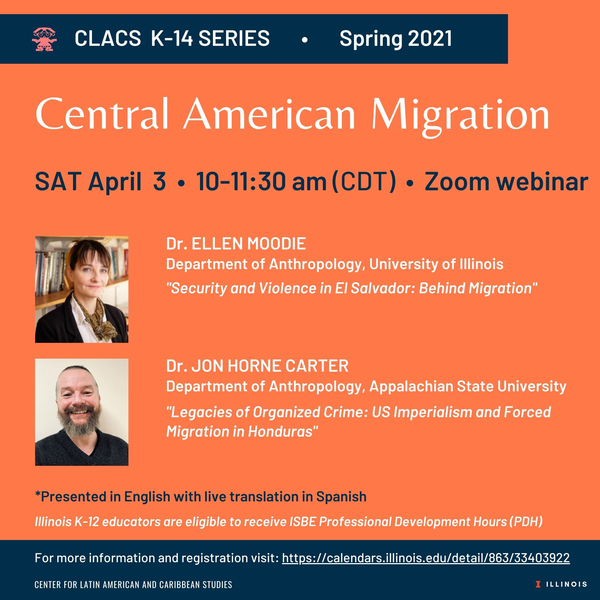CLACS K-14 Series: Central American Migration / Entendiendo las causas de la migración Centroamericana

- Sponsor
- Center for Latin American and Caribbean Studies (CLACS)
- Speaker
- Dr. Ellen Moodie, Professor of Anthropology, University of Illinois and Dr. Jon Horne Carter, Professor of Anthropology, Appalachian State University.
- Registration
- Zoom webinar registration link
- amsseu@illinois.edu
- Views
- 233
Virtual Professional Development workshop. The presentations will be in English with live translation in Spanish/ Las presentaciones van a ser en inglés con traducción simultánea al español.
Presentations:
- Dr. Ellen Moodie. "Security and Violence in El Salvador: Behind Migration" / "Seguridad y violencia en El Salvador: causas de la migración". This talk starts with the most recent news of a new “surge” of child migrants from Central America. Then, reflecting on Salvadoran President Nayib Bukele’s 2019 questions, posed after an image of a Salvadoran father and daughter, drowned the Rio Grande, circulated globally: “We can blame any other country, but what about our blame? What country did they flee?”, I turn to look at the country they fled: El Salvador. I position the history and present of El Salvador as always already part of a relationship with colonial and imperial powers. After a brief review of events and processes from liberalization in the late nineteenth century on, I consider the country’s (1980-1992) civil war as one of the last battles of the Cold War, and then examine the effects of continued postwar violence, especially that linked to gangs, as the wake or aftermath of that conflict.
- Dr. Jon H. Carter. "Legacies of Organized Crime: US Imperialism and Forced Migration in Honduras" / "Legados del crimen organizado: imperialismo estadounidense y migración forzada en Honduras". This talk examines the role of US empire in Honduras from the nineteenth century to present, to ask how US geopolitical and business interests have undermined state sovereignty in the country and created the conditions for record levels of forced migration. I will focus on three historical moments in which these external forces have fatefully reshaped Honduran governance: (a) the rise of powerful US-based banana corporations of the early twentieth century, (b) the US-funded Contra War of the 1980s, and (c) the US-supported coup of president Manuel Zelaya Rosales in 2009 and its aftermath. I ask how each of these historical episodes not only demonstrated the weakness of Honduran law enforcement and criminal justice in real-time, but also enshrined that weakness in legal and institutional norms that, over the last decade, have culminated in widespread impunity that enables criminal actors in the country—from corrupt CEOs and politicians, to narcotraffickers and gang members. I will stress the importance of seeing this “lawlessness” in an historical frame, as an artifact of more than a century of US imperialism, in which the structural weakness of Honduran law and institutions has served US geopolitical and business interests at the expense of the tens of thousands who now flee the country to seek safety and refuge abroad.
- To register/ para registrarse: https://illinois.zoom.us/webinar/register/WN_3QaqJ6pxTeGLvOSnaPAsTA
- Illinois K-12 educators are eligible to receive ISBE Professional Development Hours (PDH)